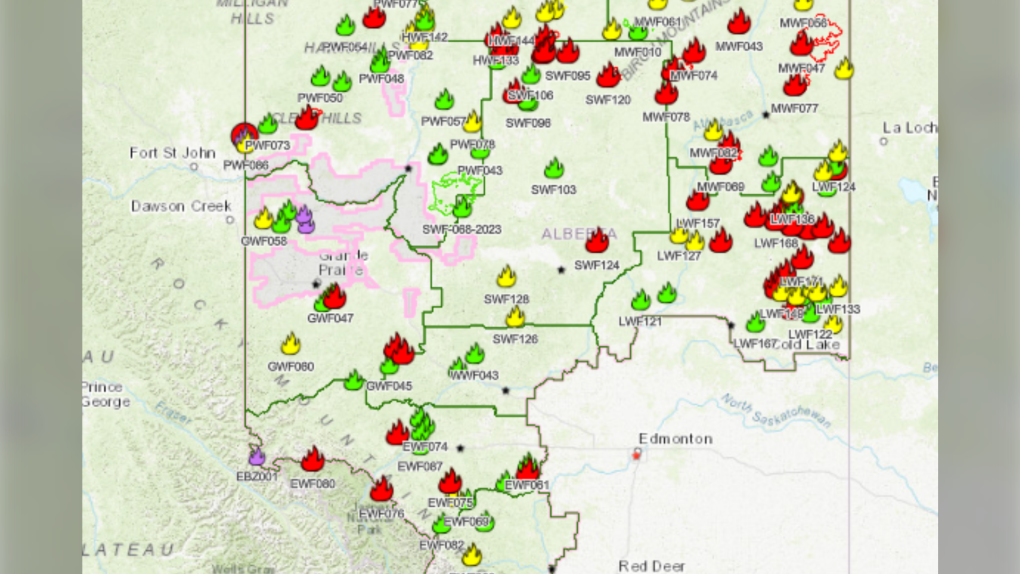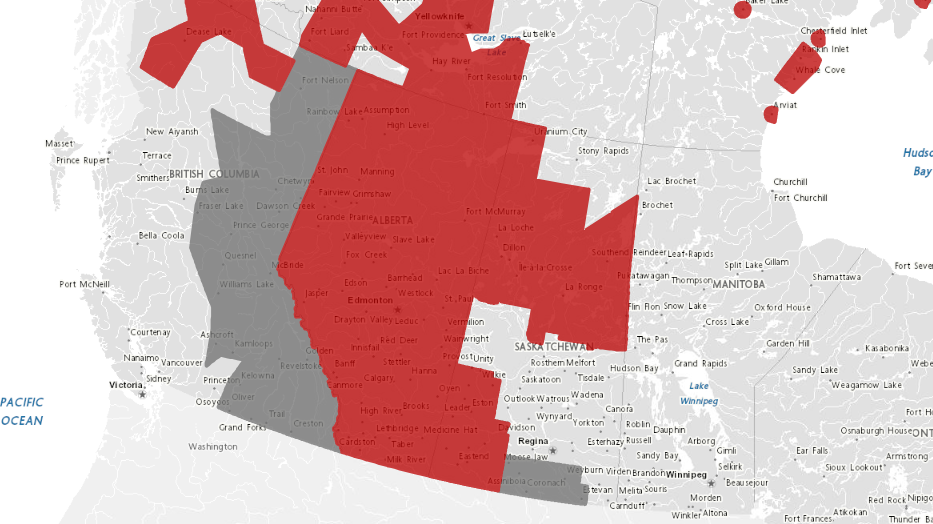Thousands of wildfire evacuees forced from Jasper National Park into British Columbia along smoke-choked mountain roads Monday night were directed Tuesday to make a wide U-turn and head home if they needed a place to stay.
Alberta fire officials said B.C. has its hands full with its own wildfires and evacuations.
“The issue is the severity of wildfire activity and evacuations in B.C. proper,” Stephen Lacroix, managing director of the Alberta Emergency Management Agency, told reporters during a video conference.
“They had no capacity to house Albertans.”
Alberta Public Safety Minister Mike Ellis said reception centres were being set up in Grande Prairie to the north and Calgary to the south.
Ellis told evacuees to take massive detours, either through Prince George, B.C., proceeding north and east to Grande Prairie, or south to Kamloops before going east to Calgary.
“One fire is approximately 12 kilometres south of Jasper on both sides of the (Athabasca) River and wind may exacerbate the situation,” Ellis told reporters.
“It’s a challenging time for all impacted.”
 Alberta wildfire status map pictured on July 23, 2024.
Alberta wildfire status map pictured on July 23, 2024.
Everyone in Jasper National Park — tourists, hikers, campers, boaters — along with 4,700 residents of the Jasper townsite were ordered out late Monday night as wildfires pinched off escape routes to the east and south.
The result was a long, slow-moving line of cars and trucks heading west through the mountains to B.C. in darkness, swirling smoke, soot and ash.
Many evacuees sought refuge for the night in Valemount, B.C., a town of 1,000 about 120 kilometres west of Jasper.
“The community’s pretty full,” said town administrator Anne Yanciw in an interview Tuesday morning.
“Every parking lot, boulevard, side of the road, field … anything that looks like it could fit a vehicle is full.”
Some evacuees spent the night on the floor of the local arena. Others bunked down at the Legion. A local church was serving a pancake breakfast while drinks, snacks, information and a respite were on offer at Valemount’s community hall and visitors’ centre.
“It’s all hands on deck,” Yanciw said.
She said most travellers were beginning to make their way down the smoky road — slowly, but without incident.
“The hope is that most of them will find the long way back to Alberta,” Yanciw said.
Fire officials said forecast windy conditions were expected to make Tuesday a challenging day for crews.
The province has been baking and sweltering for days in 30 C-plus temperatures.
The province reported 170 wildfires burning across Alberta, 56 of which were out of control.
There was a provincewide fire ban in the forest protection area.
The province estimated 17,500 Albertans were out of their homes from the Jasper fire as well as those threatening remote northern communities.
On Monday night, photos and video shared on social media illuminated a midnight cavalcade of bumper-to-bumper cars and trucks, headlights on, red tail lights glowing, cars inching, stopping, starting, crawling through swirling tendrils of acrid smoke toward B.C.
“It’s wall-to-wall traffic,” said Edmonton resident Carolyn Campbell in a phone interview from her vehicle.
“(The smoke) is pretty thick. We’ve got masks in the car.”
 An Environment and Climate Change Canada graphic shows active weather warnings across Alberta on Tuesday, July 23, 2024.
An Environment and Climate Change Canada graphic shows active weather warnings across Alberta on Tuesday, July 23, 2024.
Campbell said it took hours to move just seven kilometres. She said they had enough gas but worried for others who fled with little in the tank.
The Jasper townsite and the park’s main east-west artery, Highway 16, were caught in a fiery pincer. Fires threatening from the northeast cut off highway access east to Edmonton.
Another fire roaring up from the south forced the closure of the north-south Icefields Parkway. That left one route open — west to B.C.
The Municipality of Jasper and Jasper National Park said in an updated emergency alert Tuesday morning the evacuation from the townsite and the park is “progressing well” and people should continue to follow directives as the majority of traffic is being directed west on Highway 16.
“Only when roadside fire conditions permit, small groups of escorted vehicles will be directed east on Highway 16,” the town and park officials said in the alert.
Jasper National Park is the largest national park in the Canadian Rockies, home to campgrounds, scenic rivers and lakes, and extensive trail networks.
In Hinton, close to the east boundary of the park, Mayor Nicholas Nissen reported only a trickle of evacuees into the community.
Nissen said the sky was blue with less smoke than Monday.
“You would almost have no indication that there’s a disaster in the community next door, just with the way Hinton is right now,” Nissen said in an interview.
“With that highway closure, we’re not seeing the volumes of people we saw during evacuations last year.”
Nissen said the town has sent eight firefighters, two fire trucks and other equipment to assist in battling the blaze.
This report by The Canadian Press was first published July 23, 2024.
with files from Bob Weber in Edmonton and Jeremy Simes in Regina